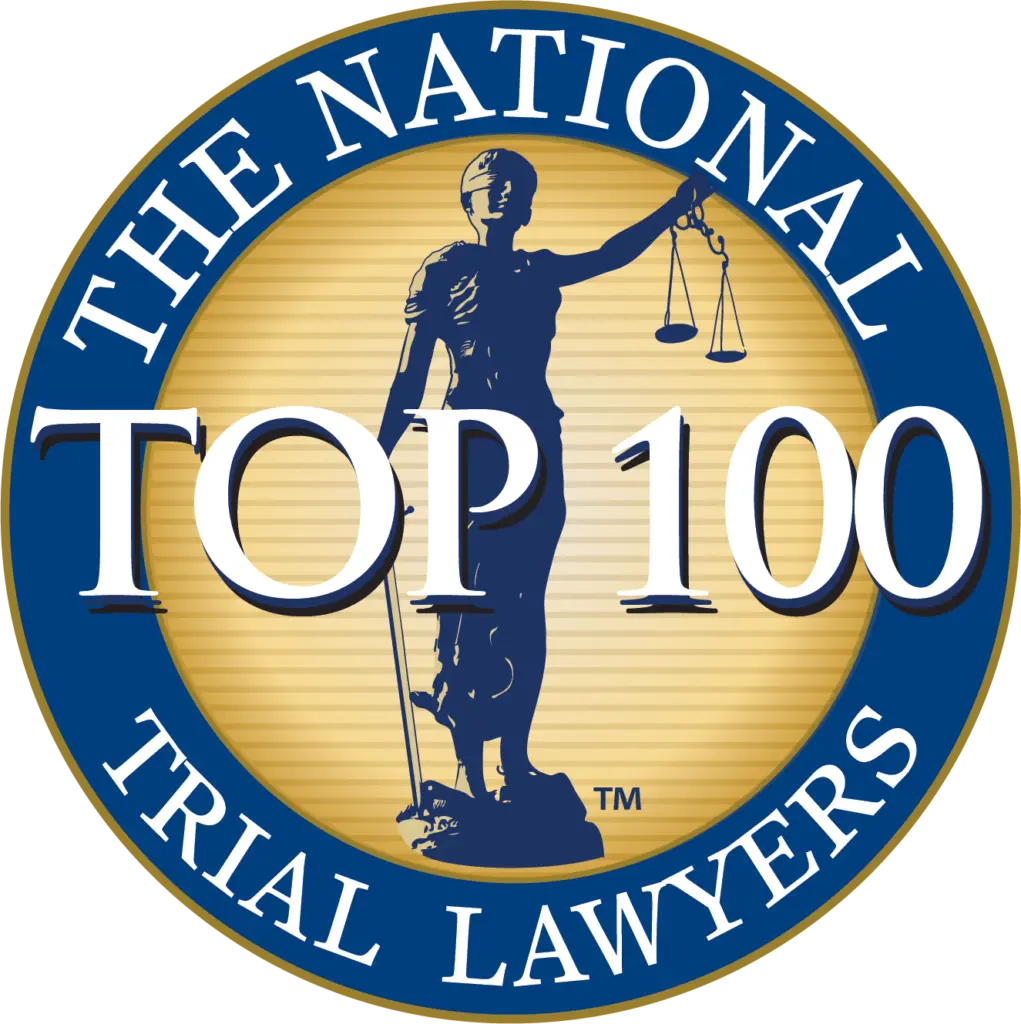
Member of the Colorado Bar Association since 2014. Attorney, Christopher M. Nicolaysen focuses primarily on helping those injured in Colorado car accidents, other auto accidents, and Colorado personal injury incidents.
This article has been written and reviewed for legal accuracy and clarity by the team of writers and attorneys at Springs Law Group and is as accurate as possible. This content should not be taken as legal advice from an attorney. If you would like to learn more about our owner and experienced Colorado personal injury lawyer, Christopher Nicolaysen, you can do so here.
Springs Law Group does everything possible to make sure the information in this article is up to date and accurate. If you need specific legal advice about your case, contact us. This article should not be taken as advice from an attorney.
Documenting the accident scene, gathering evidence, and seeking prompt medical attention are crucial steps in building a strong case for a fair auto accident settlement in Colorado.
Maintaining detailed records of your injuries, treatment, and damages is essential to support your claim and negotiate effectively with the insurance company.
Sending a well-crafted demand letter and engaging in persistent negotiations can help you secure a settlement that adequately compensates you for your physical, financial, and emotional losses.
On this page, we’ll discuss how to negotiate an auto accident settlement in Denver, tips for maximizing your car accident settlement, the role of a Denver car accident lawyer in negotiations, and much more.
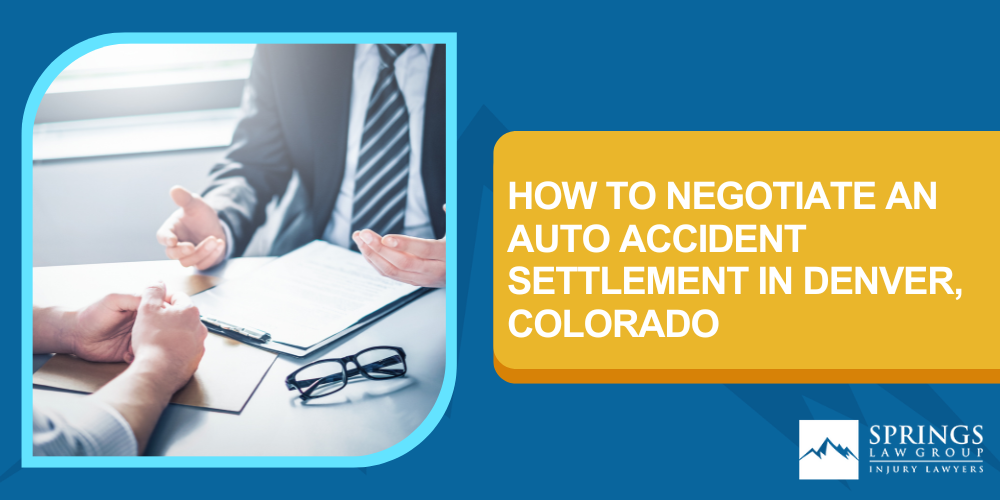
Some essential aspects to consider when negotiating a settlement include:
If you’ve been involved in an auto accident in Denver and need assistance with settlement negotiations, consulting with a skilled car accident lawyer can be invaluable.
Contact Springs Law Group today using the chat on this page for a free case evaluation and expert guidance on maximizing your auto accident settlement.

Negotiating an auto accident settlement in Colorado involves several key steps to ensure you receive fair compensation for your damages and injuries.
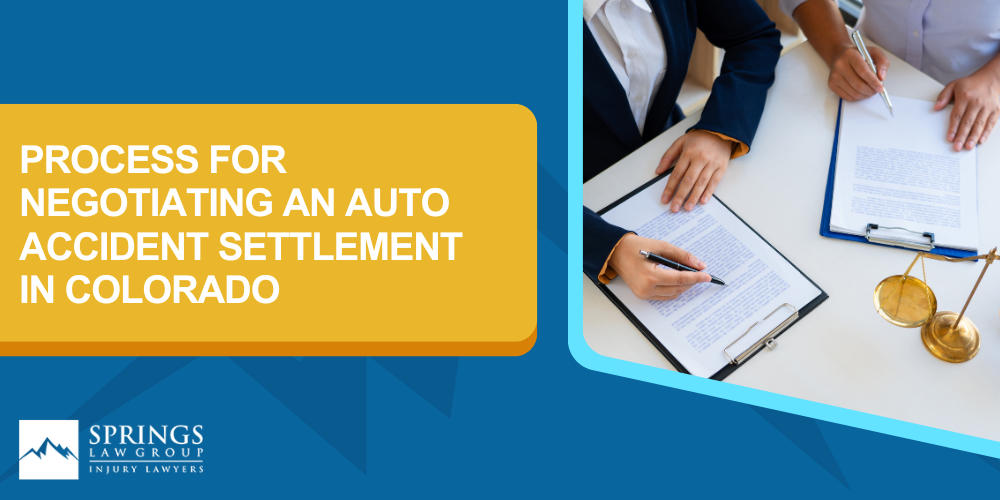
Understanding the process can help you through filing insurance claims and legal proceedings.
The primary stages in negotiating a car accident settlement include documenting the scene, reporting the accident, seeking medical treatment, assessing vehicle damage, gathering evidence, and engaging in negotiations with the insurance company.
To achieve a successful outcome, it’s crucial to be thorough, organized, and persistent throughout the process.
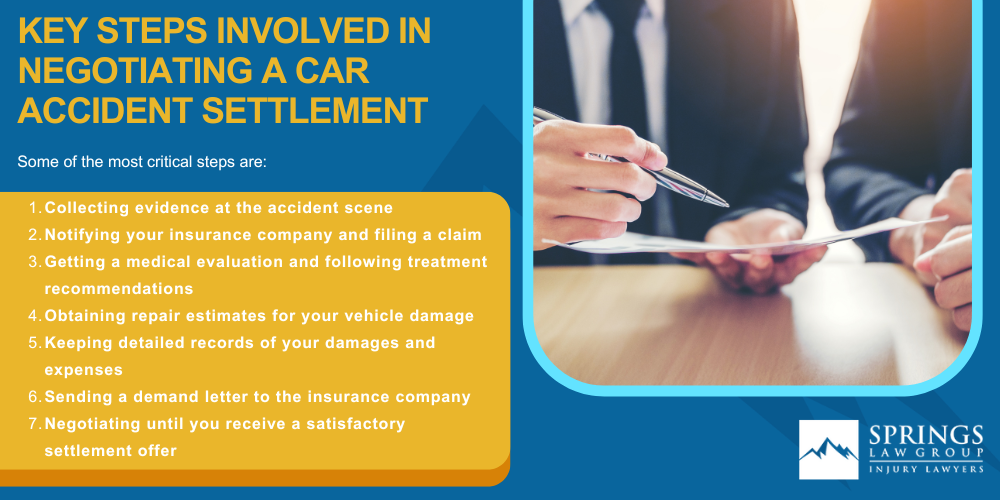
Some of the most critical steps are:
By following these steps diligently, you can build a strong case and improve your chances of securing a fair settlement.
Familiarizing yourself with the car accident settlement process in Colorado empowers you to protect your rights and interests more effectively.
When you know what to expect and what actions to take, you can avoid common pitfalls and make informed decisions throughout your case.
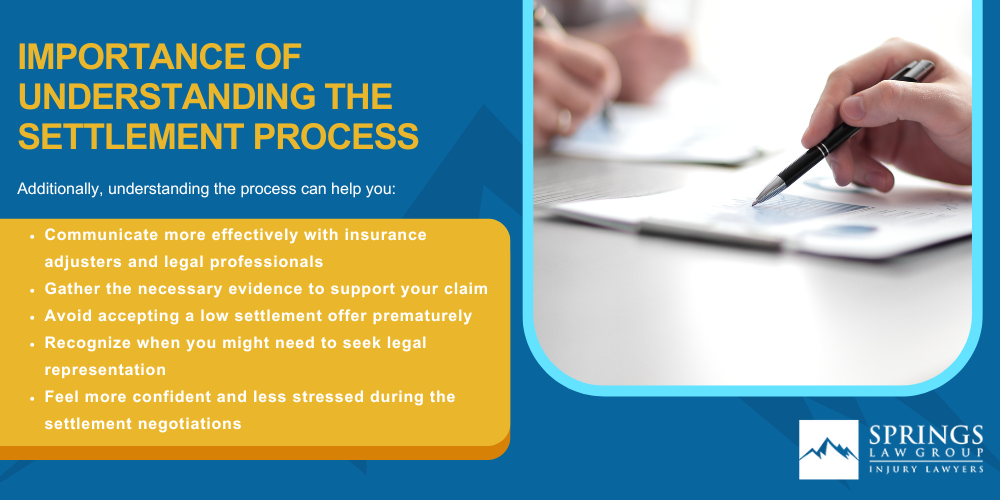
Additionally, understanding the process can help you:
Taking the time to educate yourself about the settlement process is an investment in securing the best possible outcome for your Colorado auto accident claim.
After a car accident in Colorado, one of the first critical steps is to document the scene and gather evidence to support your insurance claim or legal case.
This evidence will serve as the foundation for your settlement negotiations.
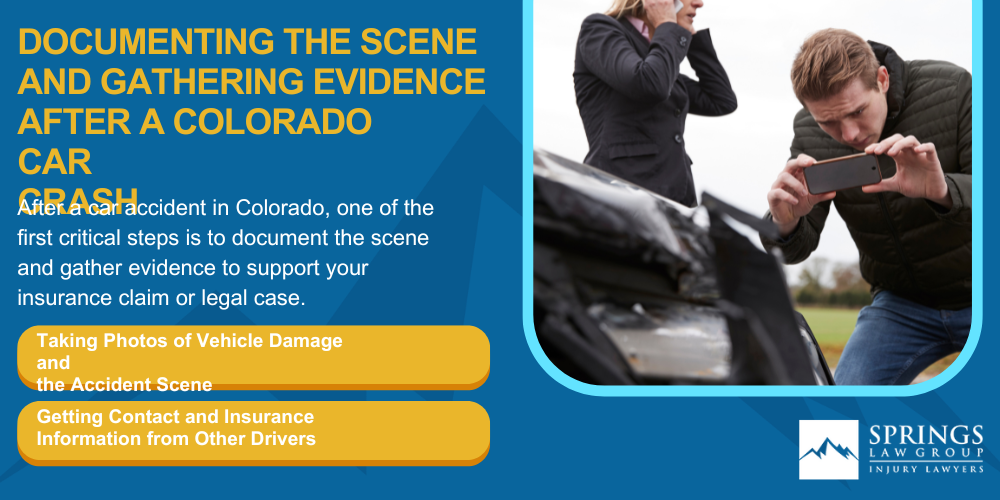
If it is safe to do so, use your smartphone to take pictures of the damage to all vehicles involved in the crash, as well as any relevant features of the accident scene, such as skid marks, traffic signs, or road conditions.
Photographs provide a visual record of the accident and can help establish fault and the extent of the damages.
Be sure to capture:
Remember to take multiple angles of each subject to provide a comprehensive visual account of the accident scene.
Exchange contact and insurance information with the other drivers involved in the accident.
Collect their full names, phone numbers, addresses, email addresses, insurance company names, policy numbers, and license plate numbers.
You should also gather:
Having this information on hand will streamline the claims process and ensure you can contact the necessary parties as you move forward with your case.
Promptly reporting your car accident to the appropriate authorities and your insurance company is essential for complying with Colorado law and initiating the settlement process.
Failing to report the accident can jeopardize your ability to secure compensation.
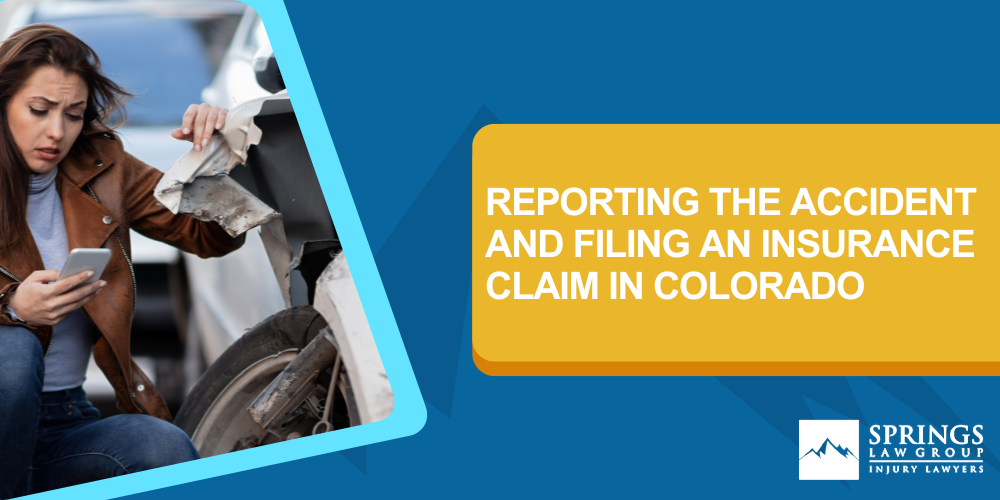
If the accident resulted in injuries, fatalities, or significant property damage, contact the police immediately to file an official report.
The responding officer will document the accident scene, gather statements from involved parties and witnesses, and create an accident report.
When speaking with the police:
If the police do not respond to the scene, you can file a report online or at a local police station, depending on the jurisdiction.
Contact your insurance company as soon as possible to report the accident and initiate the claims process.
Most insurers require prompt notification and cooperation to maintain coverage.
When filing your claim:
Be honest and forthcoming with your insurer, but refrain from admitting fault or accepting any settlement offers until you have a clear understanding of your damages and legal rights.
Even if you don’t feel seriously injured after a car accident, it’s crucial to seek medical attention to protect your health and establish a record of your injuries for your settlement claim.
Delaying treatment can worsen your condition and undermine your case.
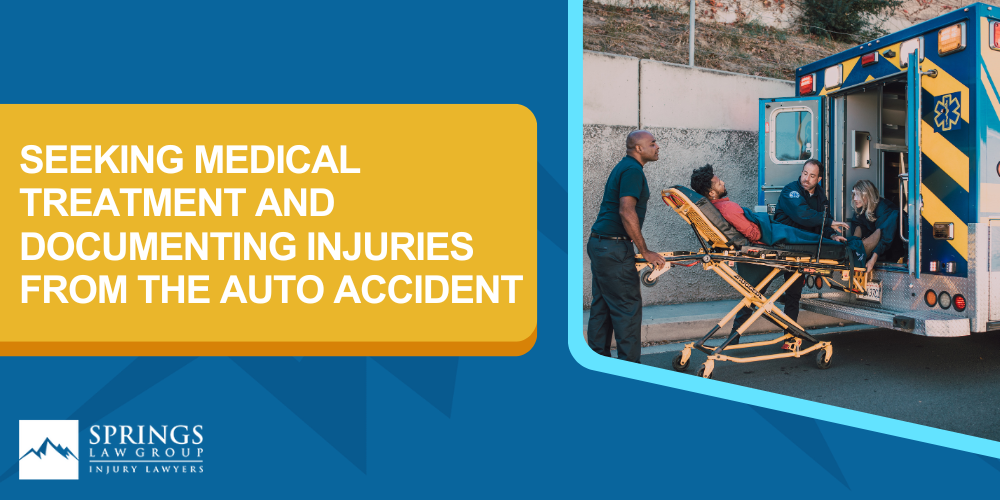
Visit an urgent care facility, your primary care physician, or a specialist as soon as possible after the accident for a thorough medical evaluation.
Inform the medical provider that you were involved in a car crash and describe any symptoms you’re experiencing, no matter how minor they may seem.
Common car accident injuries include:
Obtain copies of your medical records, bills, and any diagnostic imaging results to document your injuries and treatment costs.
If your doctor recommends ongoing treatment, such as chiropractic care, physical therapy, or specialist visits, follow through with these appointments to demonstrate your commitment to recovery and to establish a clear record of your medical expenses and damages.
Keep track of:
Consistently attending your medical appointments and adhering to your treatment plan will strengthen your case and help you achieve the best possible recovery.
Addressing vehicle damage is another essential aspect of the auto accident settlement process in Colorado.
You’ll need to obtain repair estimates and decide on a course of action to restore your vehicle to its pre-accident condition or receive compensation for its value.
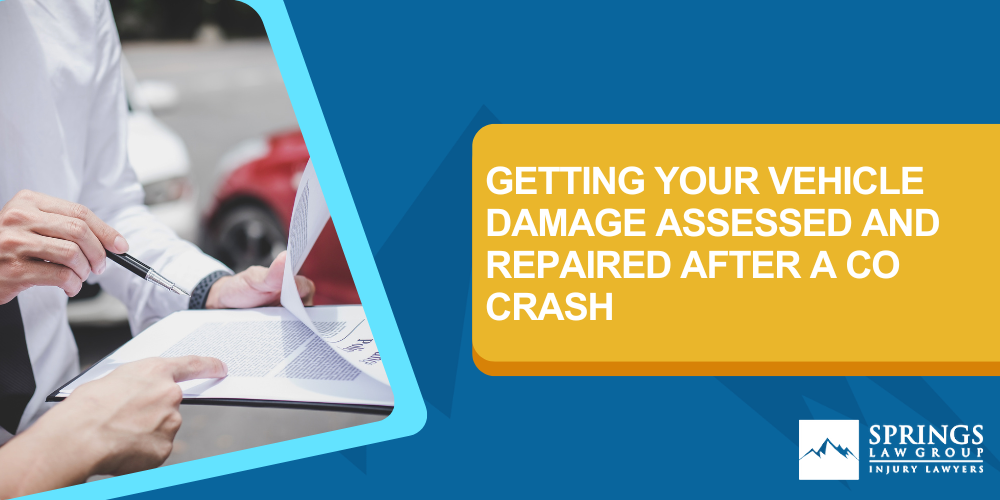
Your insurance company may recommend specific repair shops or provide an estimate for the cost of repairs.
While these recommendations can be helpful, you are not obligated to use the insurer’s preferred providers.
When considering the insurance company’s recommendations:
Remember that the insurance company’s goal is to minimize costs, so their recommendations may not always align with your best interests.
To ensure you receive a fair and accurate assessment of your vehicle’s damage, consider taking it to a trusted mechanic or auto body shop of your choice for an independent inspection.
This can provide a basis for comparison against the insurance company’s estimate.
When choosing a mechanic:
Having an independent assessment of your vehicle’s damage can help you negotiate a fair settlement and ensure your car is repaired to your satisfaction.
Maintaining accurate records and notes about your injuries, treatment, and damages is crucial for building a strong auto accident settlement case in Colorado.
This documentation will serve as evidence to support your claim and help you negotiate a fair settlement.
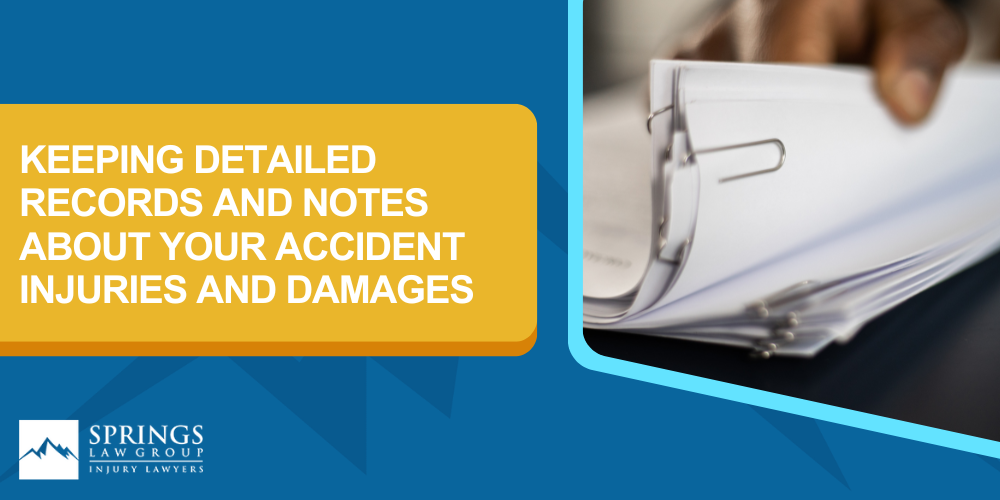
Keep a daily journal to record your pain levels, symptoms, and how your injuries impact your daily life.
This can provide valuable insight into your recovery process and the extent of your damages.
In your journal, note:
Be as detailed as possible in your entries, as this information can help illustrate the full impact of the accident on your life.
When discussing your injuries with healthcare providers, be honest and transparent about your symptoms and limitations.
Avoid downplaying or exaggerating your pain, as this can damage your credibility and hinder your recovery.
Be sure to:
Remember that your medical records will play a significant role in your settlement negotiations, so it’s essential to provide accurate information to your healthcare team.
Once you have completed your medical treatment and have a clear understanding of your damages, it’s time to gather your documentation and send a settlement demand letter to the at-fault party’s insurance company.
This letter outlines your case and requests a specific settlement amount.
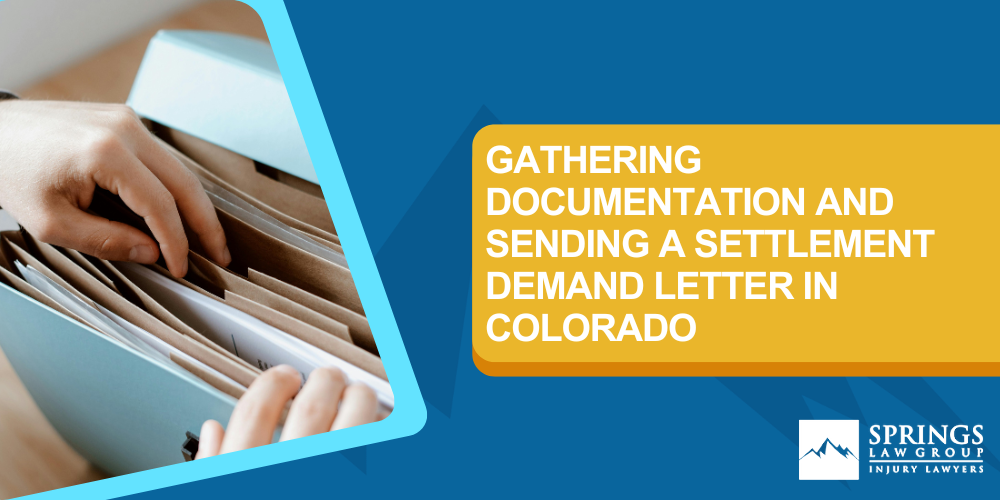
Organize all the relevant documentation related to your auto accident, including:
Make copies of these documents to include with your demand letter, and keep the originals for your records.
A well-crafted demand letter should clearly state the facts of the accident, the extent of your injuries and damages, and your settlement request.
It should be professional, concise, and persuasive.
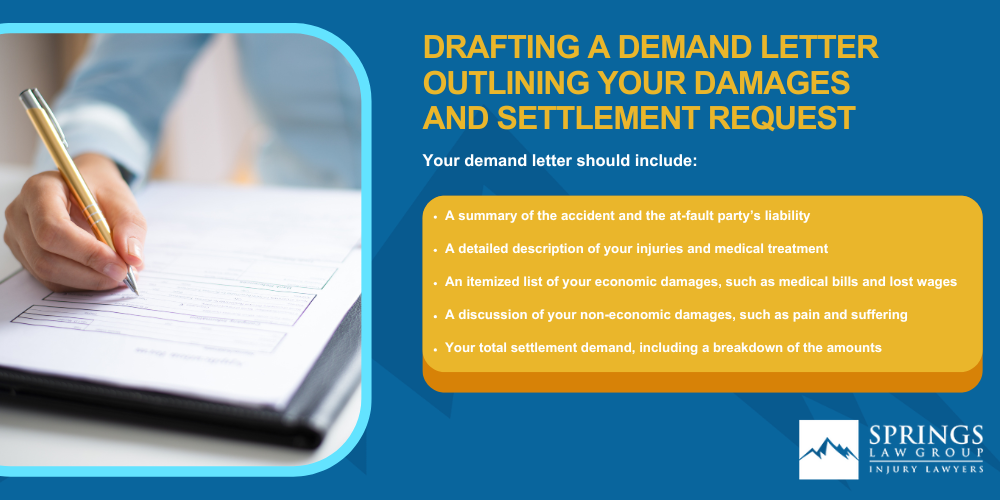
Your demand letter should include:
Send your demand letter via certified mail to ensure receipt and maintain a copy for your records.
After submitting your demand letter, the insurance company will likely respond with an initial settlement offer.
This offer may be lower than your requested amount, leading to a negotiation process to reach a mutually agreeable settlement.
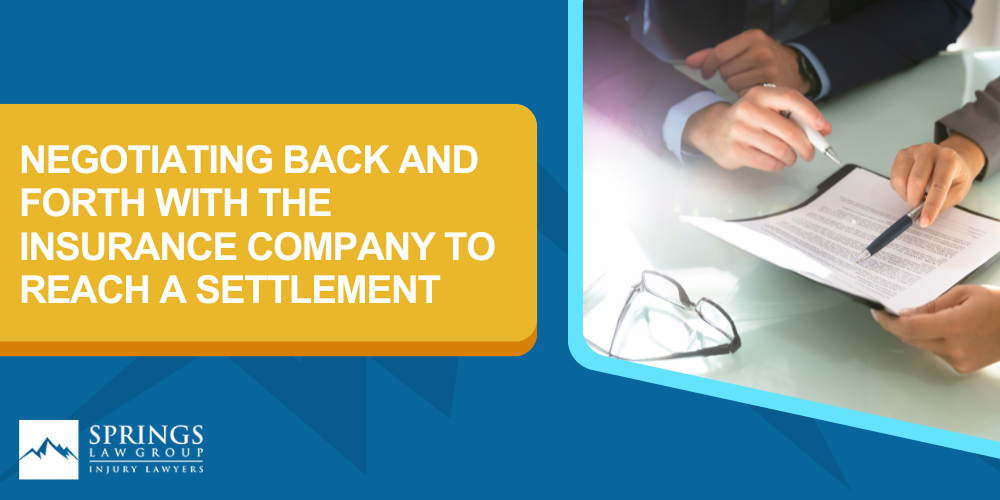
Review the insurance company’s initial offer carefully, comparing it to your own assessment of your damages.
Consider factors such as your total medical expenses, lost wages, property damage, and pain and suffering.
When evaluating the offer:
Remember that initial offers are often low, and you should be prepared to negotiate for a higher settlement.
If the initial offer is unsatisfactory, submit a counteroffer that more closely aligns with your original demand.
Support your counteroffer with evidence and arguments that justify the higher amount.
During negotiations:
Continue negotiating until you receive an offer that fairly compensates you for your damages and allows you to move forward from the accident.
Once you and the insurance company agree on a settlement amount, it’s time to finalize the agreement and receive your compensation.
This process involves reviewing and signing legal documents and ensuring that all outstanding bills and liens are addressed.
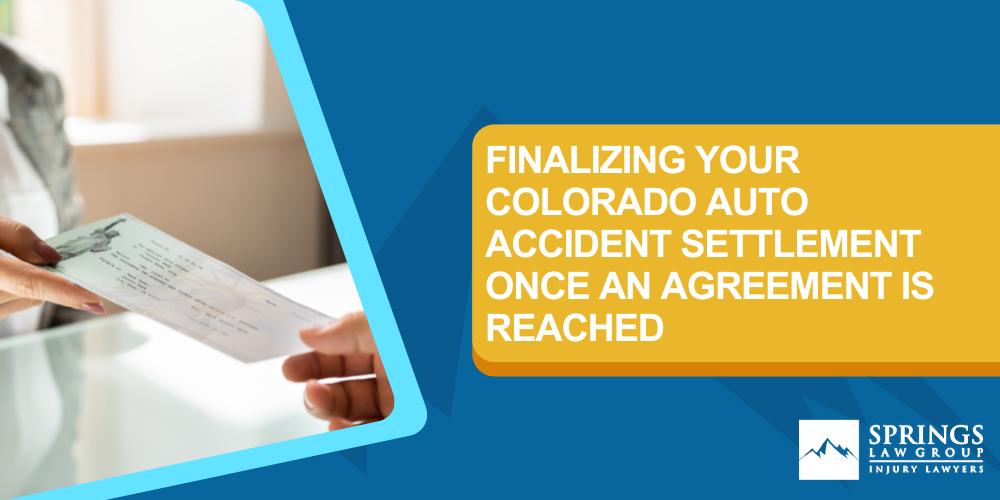
The insurance company will send you an official settlement agreement and release form.
Review these documents carefully to ensure they accurately reflect the agreed-upon settlement terms and do not contain any unfavorable provisions.
Before signing:
Once you are satisfied with the settlement documents, sign and return them to the insurance company, keeping copies for your records.
After the insurance company receives your signed settlement documents, they will process your payment and issue a settlement check.
This process typically takes a few weeks.
Upon receiving your settlement check:
If you have an attorney, they will typically handle the distribution of funds and ensure that all necessary payments are made.
The primary stages include documenting the accident scene, reporting the crash, seeking medical treatment, assessing vehicle damage, gathering evidence, and negotiating with the insurance company.
Following these steps thoroughly and persistently can help you build a strong case and secure a fair settlement.
Seeking prompt medical attention after an auto accident is crucial for protecting your health and establishing a record of your injuries for your settlement claim.
Delaying treatment can worsen your condition and undermine your case, so get evaluated by a doctor as soon as possible.
Take your vehicle to a trusted mechanic or auto body shop for an independent inspection and repair estimate.
This provides a basis for comparison against the insurance company’s estimate and helps ensure your car is repaired properly.
Your demand letter should summarize the accident, describe your injuries and treatment in detail, itemize your economic damages like medical bills and lost wages, discuss non-economic damages like pain and suffering, and state your total settlement request.
Include supporting documentation and send the letter via certified mail.
Once you agree on a settlement amount, review and sign the official settlement and release documents, ensuring they accurately reflect the terms and protect your rights.
After the insurance company processes your signed documents, you’ll receive your settlement check and can pay any outstanding accident-related bills or liens.

Partner
Attorney, Christopher M. Nicolaysen focuses primarily on helping those injured in car accidents due to no fault of their own.
The personal injury matters include auto accidents, bicycle accidents, pedestrian accidents, and trucking accidents.
Chris truly enjoys helping clients through a difficult time and helping them get the compensation they deserve.
We use reviews to help show more people like you why we do what we do!

I was uneasy about reaching out to a law firm after being in an accident that left me injured and my vehicle totaled. I don’t care for the idea of suing for what was very clearly an accident. However, after learning more about the overall process of working with a professional team to navigate the murky waters of the insurance world, I was pleasantly surprised to find that the experience wasn’t as gross as I’d originally felt about it.

Springs Law is very friendly and professional. I always felt that they were on my side and cared about my injury and what I was going through. I highly recommend them.

Springs Law Group is an amazing group to work with! I got into a rough accident, and they never ceased to let me know they were there working hard to help me in my hour of need. It was always very easy to reach out to someone if I had any questions, and they were always happy to answer any questions I had.

I never have a problem with getting a response when I need them – which is not the case with most other firms. They really truly care about each client. As a plus, they always have positive attitudes, which matters tremendously when you are in a stressful legal situation.
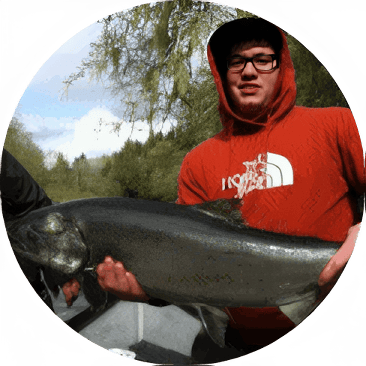
Big thanks to Mr. Jake Kimbell and his team for their assistance with my case. He helped me through an incredibly challenging part of my life, and most importantly helped navigate through the convoluted legal channels of my case. I cannot thank him and his team enough for their support.

The entire team at Springs Law group has been nothing but amazing. Jake and the rest of the staff were great to work with and extremely professional. They were very attentive and answered any questions and concerns I had. I was always able to contact them and they were very responsive and communicated with me.

Springs Law Group is an amazing group to work with! I got into a rough accident, and they never ceased to let me know they were there working hard to help me in my hour of need. It was always very easy to reach out to someone if I had any questions, and they were always happy to answer any questions I had.
